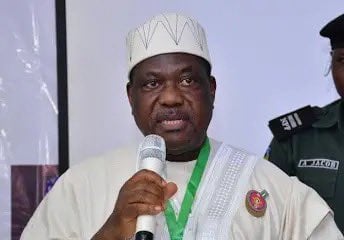BENIRN KEBBI: The Federal Government on Wednesday linked the renewed wave of terror attacks including the abduction of schoolgirls in Kebbi and the deadly assault on worshippers in Eruku, Kwara State to recent comments by United States President Donald Trump, as anger over worsening insecurity spread across the country.
Secretary to the Government of the Federation, George Akume, said Trump’s posts alleging Christian genocide in Nigeria and threatening possible deployment of US troops had emboldened violent opportunistic groups now seeking global attention by attacking soft targets.
Akume said insurgency structures had been significantly degraded before the remarks, which he claimed provided terrorist factions with a narrative to justify renewed hostilities.
He insisted that Nigeria remains committed to collaboration not public stigmatization, with its international partners.
Trump had, between October 30 and November 1, labelled Nigeria a Country of Particular Concern and warned of military action if alleged killings of Christians continued. He also threatened to suspend US assistance to Abuja.
Akume dismissed claims of a Christian genocide, stressing that verified evidence showed criminal groups attacking both churches and mosques. Nigeria, he said, remains a secular state, and government appointments reflect its religious diversity.
He added that the Armed Forces have reclaimed vast territories and degraded Boko Haram and ISWAP, insisting Nigeria does not require foreigners
The Zuru Emirate was plunged into panic on Monday when bandits invaded Government Girls Comprehensive Senior Secondary School, Maga, killing the Vice-Principal, Hassan Makuku, who reportedly died shielding students. At least 24 schoolgirls are still in captivity; two others escaped.
Kebbi’s Commissioner for Basic and Secondary Education, Prof. Halima Bande confirmed the figures and said the escapees Salma and Hauwa’u Liman were reunited with their families.
In Kwara State, gunmen stormed Christ Apostolic Church, Oke Isegun, Eruku, during a live-streamed service Tuesday night, killing at least two worshippers and abducting over 35 congregants.
Eyewitnesses said the attackers shot indiscriminately, including from a tree outside the church. Security forces and local vigilantes have since launched a manhunt.
President Bola Tinubu cancelled scheduled trips to the G20 Summit in South Africa and the AU–EU Summit in Angola to receive direct security briefings. He ordered massive reinforcements in Ekiti LGA and demanded
Governor Abdulrahman Abdulrazaq, after visiting Eruku, announced moves to establish a Forward Operating Base and a mobile police squadron.
He accused police officers of failing the community, alleging that they tear-gassed residents chasing the bandits.
A youth leader, Shola Peters, echoed the accusations, saying locals had supported the police providing accommodation yet were abandoned during the attack.
The resident pastor, Lawrence Bamidele, said the attack occurred during a thanksgiving service for 18 kidnap victims recently released.
The Jama’atu Nasril Islam (JNI) condemned the Kebbi abduction as one tragedy too many, likening it to Chibok and Dapchi.
It criticized security lapses and warned that repeated attacks threaten girl-child education in the North.
The African Democratic Congress (ADC) said the government’s defensive posture was turning the Christian genocide narrative into a dangerous self-fulfilling prophecy.
Former presidential candidate Rabiu Musa Kwankwaso decried escalating insecurity, citing the Kebbi school abduction, killings in Kano, and the murder of Brig. Gen. Uba in Borno as proof of a deteriorating intelligence framework.
Former Rivers governor Rotimi Amaechi accused the Tinubu administration of lacking the political will to protect Nigerians, urging the President to prioritise security over foreign engagements.
The Nigeria Labour Congress expressed grief and called for stronger nationwide surveillance, warning that the Kebbi attack signals deeper, unaddressed security problems.
Activist Omoyele Sowore, musician Falz, lawyer Inibehe Effiong, and several public figures demanded Tinubu’s resignation, citing his inability to stop mass killings.
Falz reposted a 2014 comment where Tinubu had asked then-President Jonathan to resign over insecurity. The same demand, he insisted, now applies to Tinubu.
Celebrities including Debo Macaroni, Femi Adebayo, and Simi described the killings as evidence of a collapsing security architecture and urged urgent government action.



